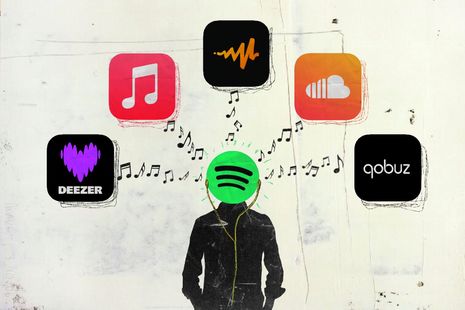Spotify substitutes: can ethical streaming sound just as good?
Diving into a range of alternative music apps, Caitlin Newman encourages us to foster conscious listening habits

The Cambridge bubble – especially during exam season – has a way of putting you in consumption autopilot. It’s all too easy to find yourself buying the same products, avoiding media beyond your echo chamber, and taking repeat purchases for granted. Processing the world beyond academia can be overwhelming, but the free time provides the opportunity to explore how we can spend responsibly. As someone who practically lives in their headphones, exploring how I access music seemed like an obvious starting point.
Criticism of Spotify is notably on the rise. Whether it be for the app’s low payout to artists, its platforming of AI-generated music or Chief Executive Daniel Ek’s investments into weapons, Spotify resentment is rapidly emerging. However, the popular alternatives aren’t much better. My former go-to, Apple Music, pays more per stream (around $0.01 compared to Spotify’s $0.003 average), but is nonetheless infamous for its questionable investment choices. It seems that if you want to stream music ethically, you’re going to have to dig a little deeper.
“Qobuz only allows non-paying listeners to access thirty second snippets of songs”
I’ve investigated four alternative streaming services: Audiomack, SoundCloud, Deezer, and Qobuz, all in hope of meeting your musical demands. Audiomack is the most affordable option and thus pays artists less, while the most expensive options (though more generous with student discounts) of Deezer and Qobuz have artist pay rates closer to Apple Music. But are these alternatives just as good as the household names?
Your typical streaming service offers an endlessly vast catalogue, spanning across genres, time periods, and levels of artist popularity from A-list to amateur. However, unlike Spotify, the apps I explored offer restricted catalogues for non-paying listeners. Audiomack focuses on hip-hop and R&B of all levels of popularity; SoundCloud, on the other hand, offers relatively niche tracks for free but is less limited regarding genre.
Music access works a little differently on Qobuz: Qobuz only allows non-paying listeners to access 30 second snippets of songs. I was mostly successful in finding my favourite artists, though some earlier releases were missing; after having fallen deep into the lore, I was especially disheartened by the absent Sleep Token singles. Deezer, while having the most comprehensive catalogue, was inconsistent in what it would allow you to stream for free. On some occasions, I was able to listen to pretty much any track I wanted in full, but at other times, my experience felt heavily restricted.
“This plethora of options proved overwhelming”
When it comes to personalisation, Spotify has set the bar high. Spotify is renowned for its uniquely titled daylists – my old accounts are still generating zany examples like baddiecore rockin’ saturday evening or lawn-mowing potpourri sunday. While it was entertaining to see other apps’ takes on curation, holding these up against Spotify or Apple made it glaringly obvious as to when these were just less successful replicas of a trend.
Neither Audiomack nor SoundCloud quite managed to grasp my preferences. SoundCloud makes a greater attempt to, with the homepage currently containing no less than eleven personalised mixes – but, if anything, it felt too organised. Deezer’s attempts were considerably more successful: as soon as you sign up, you’re asked to select multiple favourite artists, so recommendations were accurate before even listening to any music. Alongside personalised playlists, Deezer’s Flow station allows you to control the suggestions you receive by mood, genre and even whether you want to discover something new or hear your existing favourites.
“I implore any fellow audiophiles to trial streaming services beyond your usual remit”
On paper, that potentially sounds better than Spotify, but I must admit that this plethora of options proved overwhelming. I found myself drawn to Qobuz’s pared back alternative of just one individualised playlist alongside the less personal but equally unique compilations. In a way, I’ve found myself being more adventurous thanks to this format, exploring collections from nostalgic 2005 pop playlists to gothic metal band Halestorm.
However, this hardly matters if the music doesn’t sound first-rate. As a user of Apple Music, acclaimed for its audio quality, I was pleasantly surprised by all of the alternatives I tried. SoundCloud and Audiomack were once again indistinguishable; the vocals and instruments all sounded individually crisp and united beautifully in high-energy moments without any major loss of strength, especially with regards to drumlines and vocals. With higher contrasts in dynamics, Deezer’s sonic calibre proved more impactful. However, Qobuz took the edge ever so slightly – with an audible bassline and reverb, the depth of the sound was palpable.
Taking every aspect into account, there was no objective “winner” – all of the apps were high quality, with similar essential features but quite varied nuances. Akin to picking a college, knowing the facts is important, but ultimately, the final decision depends on what clicks with you. For me, that was undeniably Qobuz. Whether it was the similarities with Apple Music or the hand-picked approach of the recommendations, the app shone through to me for its inviting, grass-roots warmth. Nevertheless, I implore any fellow audiophiles to trial streaming services beyond your usual remit. With such variation between them, it’s clearly possible to find one suited to both your needs and values.
 News / Deborah Prentice overtaken as highest-paid Russell Group VC2 February 2026
News / Deborah Prentice overtaken as highest-paid Russell Group VC2 February 2026 News / Christ’s announces toned-down ‘soirée’ in place of May Ball3 February 2026
News / Christ’s announces toned-down ‘soirée’ in place of May Ball3 February 2026 Fashion / A guide to Cambridge’s second-hand scene2 February 2026
Fashion / A guide to Cambridge’s second-hand scene2 February 2026 News / Downing Bar dodges college takeover31 January 2026
News / Downing Bar dodges college takeover31 January 2026 Comment / Men at Cambridge are experiencing equality2 February 2026
Comment / Men at Cambridge are experiencing equality2 February 2026










